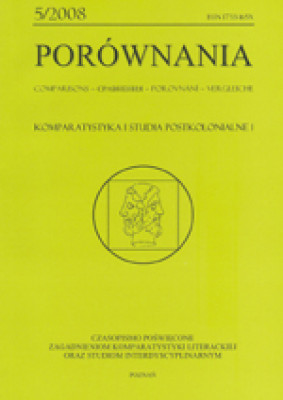Comparative Literature and Postcolonial Studies – New Posibilities for Comparative Studies?
The article propounds a thesis that postcolonial studies derives from a comparative impulse and subsequently develop as a discourse comparative in nature. Postcolonialism reveals its comparative drive the most in understanding imperialism as a dynamic forcefield where hegemony, coercion and subjugation are faced and challenged with oppositional forms from sly mimicry through open resistance up to diversity of parodic reclamations and textual reappropriations in the strategy of ‘rewriting’. The author claims that new comparativism informed by postcolonial studies, remarkably via Edward Said’s work, disrupts binarisms fundamental not only for the imperial thinking about identity, but also for nationalism that also needs clear divisions. Comparativism premised on postcolonial studies does not seek to prove the complete rejection and overcoming of colonialism, but, rather, reveals the ambivalent aftermath of colonialism and opens up a new perspective, in Said’s words, of nomadic and contrapuntal historiography and history of literature. The foundational theoreticians of postoclonialism – Edward Said, Gayatri Chakravorty Spivak and Homi Bhabha, to mention just the chief names – recognized the importance of the tradition of comparative literature and called for expanding its borders beyond Europe. Likewise, each of them differently, offers a theory of comparativism enhanced by postcolonial sensibilities.The article concludes with a tone of criticism to warn against the all too easy association of postcolonial literature with a global or cosmopolitan migrant writing marketed as the new world literature prophesied by Goethe. Instead such marketing, a new critical attention to new cosmopolitanisms, new forms of translation, is needed. The article propounds a thesis that postcolonial studies derives from a comparative impulse and subsequently develop as a discourse comparative in nature. Postcolonialism reveals its comparative drive the most in understanding imperialism as a dynamic forcefield where hegemony, coercion and subjugation are faced and challenged with oppositional forms from sly mimicry through open resistance up to diversity of parodic reclamations and textual reappropriations in the strategy of ‘rewriting’. The author claims that new comparativism informed by postcolonial studies, remarkably via Edward Said’s work, disrupts binarisms fundamental not only for the imperial thinking about identity, but also for nationalism that also needs clear divisions. Comparativism premised on postcolonial studies does not seek to prove the complete rejection and overcoming of colonialism, but, rather, reveals the ambivalent aftermath of colonialism and opens up a new perspective, in Said’s words, of nomadic and contrapuntal historiography and history of literature. The foundational theoreticians of postoclonialism – Edward Said, Gayatri Chakravorty Spivak and Homi Bhabha, to mention just the chief names – recognized the importance of the tradition of comparative literature and called for expanding its borders beyond Europe. Likewise, each of them differently, offers a theory of comparativism enhanced by postcolonial sensibilities.The article concludes with a tone of criticism to warn against the all too easy association of postcolonial literature with a global or cosmopolitan migrant writing marketed as the new world literature prophesied by Goethe. Instead such marketing, a new critical attention to new cosmopolitanisms, new forms of translation, is needed.
ISSN: 1733-165X
| Article Title | Type | Size |
|---|---|---|
| Kolodziejczyk | [pdf] | [264 KB] |
